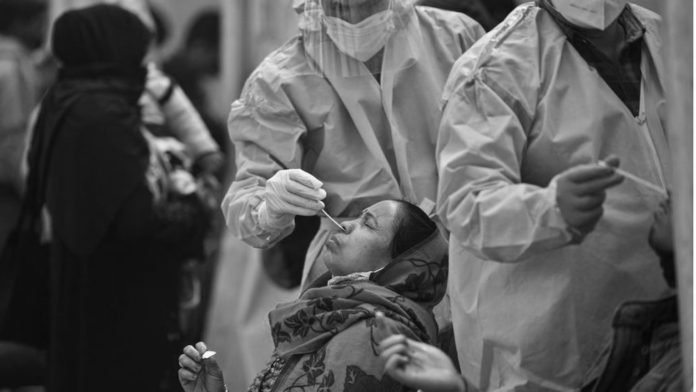India reported 58,097 new Covid-19 cases and 534 deaths in the 24 hours ending 9 am Wednesday. With 15,389 recoveries, the active cases in the country stood at 2,14,004. A total of 2,135 cases of Omicron variant of coronavirus have been detected in the country so far. According To the Ministry of Health.
In the wake of surging Covid cases, Delhi became the first major metro to impose a weekend curfew. Officials said that all services, except shops selling essential items such as groceries, will be shut over the weekend. And the earlier curbs on public transport, whereby the permitted occupancy was restricted to 50 per cent of total seats, has been removed.
With Covid cases rising in the city, the Mumbai civic body has made rapid RT-PCR test mandatory for all international passengers landing at the international airport, as per revised guidelines. But health officials in the city are faced with another big crisis — amid a surge in demand for at-home antigen testing kits, they fear that many positive cases are going unreported.
The Karnataka government has also imposed a weekend curfew and has extended the night curfew for two weeks in the state. The government also decided to shut schools and pre-university colleges except for 10th and 12th standard students for two weeks.
More about Omicron
The Omicron variant has been called a variant of concern by WHO based on studies that shows it has several mutations.
Still a lot of research is underway to evaluate its transmissibility, severity and reinfection risk.
The Omicron variant has been detected in several regions of the world. WHO reports that the likelihood of the Omicron variant spreading further globally is high.
It is not currently known if the Omicron variant is more or less severe than other strains of COVID-19, including Delta. Studies are ongoing and this information will be updated as it becomes available.
It is not yet clear whether Omicron can spread more easily from person to person compared to other variants, such as Delta.
However, being vaccinated and taking precautions such as avoiding crowded spaces, keeping your distance from others and wearing a mask are critical in helping to prevent the spread of COVID-19, and we know these actions have been effective against other variants.
Researchers are looking into any potential impact the Omicron variant has on the effectiveness of COVID-19 vaccines. Although information is still limited, WHO believes it is a reasonable assumption that the currently available vaccines offer some protection against severe disease and death.
It is also important to be vaccinated to protect against the other widely circulating variants, such as the Delta one. When it’s your turn, make sure to get vaccinated. If your vaccination involves two doses, it’s important to receive both in order to have the maximum protection.
According to WHO, early evidence suggests that people who have previously had COVID-19 could be reinfected more easily with Omicron, in comparison to other variants of concern. Information is still limited though and we will share updates as it becomes available.
Source: UNICEFRead more Health News
Latest update Omicron

